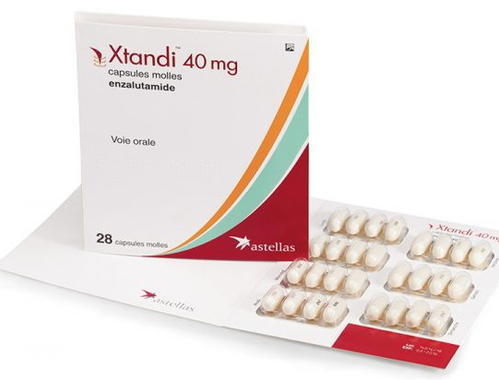Metastatic hormone-sensitive prostate cancer (mHSPC) patients have better survival rates with Enzalutamide
Source: Thailand Medical News Jun 03, 2019 6 years, 4 months, 1 week, 4 days, 17 hours, 16 minutes ago
Findings of a study presented during the American Society Of Clinical Oncology (ASCO) Annual 2019 Meeting(31st May to 4th June) in Chicago by Dana-Farber Cancer Institute showed that Enzalutamide, an oral androgen receptor inhibitor, can improve outcomes for men with metastatic hormone-sensitive prostate cancer (mHSPC).

Analytical results of the ANZUP-led international randomized, phase III ENZAMET trial demonstrated that among men with mHSPC who received testosterone suppression, those given enzalutamide in addition to their standard protocol,survived longer overall than those who were also given standard nonsteroidal androgen receptor inhibitors. Among trial participants, 80% of those treated with enzalutamide were alive after three years compared to 72% of the men who received the standard inhibitors.
Christopher Sweeney, MBBS of Dana-Farber Cancer Institute's Lank Center for Genitourinary Oncology commented in an exclusive interview with Thailand Medical News correspondents attending the ASCO meeting,”These findings are truly practice-informing, adding an effective drug option in treating mHSPC. Adding enzalutamide to testosterone suppression in men with mHSPC can give much better cancer control and much longer survival, this is true both for patients with high burden of disease, with multiple bone metastases or liver metastases, as well as men with a lower burden of disease. The new treatment option is especially relevant for men who cannot tolerate chemotherapy and have a lower burden of disease."
The benefits of enzalutamide had already been established for prostate cancers that are no longer responding to hormonal therapy.The actual result in patients starting hormonal therapy, showed that patients had a 60% improvement in the time it takes to detect the cancer growing again along with a 33% increase chance of survival.
When compared docetaxel, a chemotherapy drug approved for the condition that was given to about 45% of trial participants. ENZAMET showed that in this group, enzalutamide and docetaxel are both active and are reasonable alternatives but had different side effects, cost factors, risks and benefits.
Early studies suggested that among men with a lower burden of metastatic disease being given testosterone suppression, enzalutamide may offer more benefits than docetaxel. Combining testosterone suppression with both enzalutamide and docetaxel delayed time for the disease to progress. Researchers are currently following with trial participants to see if this triplet combination also improves quality of life, overall survival and any side effects.
The ENZAMET trial showed that side effects known to be associated with enzalutamide resulted in a modest increase in adverse events compared to men receiving one of the standard non-steroidal anti-androgens.
In the US alone, more than 175,000 men will be diagnosed with prostate cancer and 32,000 men will die from the disease this year according to statistics provided by NCI. About 95% of men are diagnosed with localized disease via prostate specific antigen (PSA) screening. Most are cured by surgery or radiation.
The U.S. Food and Drug Administration has approved enzalutamide for men where the disease continues to progress, both for men who have been treated with docetaxel and men who have not.
ENZAMET is a collab
orative investigator-initiated study led by the Australian and New Zealand Urogenital and Prostate (ANZUP) Cancer Trials Group and sponsored by the University of Sydney, in collaboration with the Canadian Cancer Trials Group, Dana-Farber and Cancer Trials Ireland. Around the world, 83 research institutions participated. The trial enrolled 1,125 participants and followed them for a median of 34 months. Funding came from Cancer Australia and the Canadian Cancer Society.
